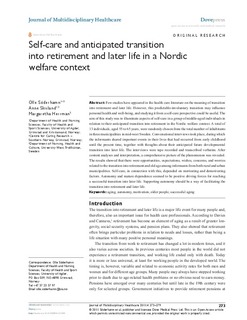| dc.contributor.author | Söderhamn, Olle | |
| dc.contributor.author | Skisland, Anne | |
| dc.contributor.author | Herrman, Margaretha | |
| dc.date.accessioned | 2011-08-25T13:00:44Z | |
| dc.date.available | 2011-08-25T13:00:44Z | |
| dc.date.issued | 2011 | |
| dc.identifier.citation | Söderhamn, O., Skisland, A., & Herrman, M. (2011). Self-care and anticipated transition into retirement and later life in a Nordic welfare context Journal of Multidisciplinary Healthcare, 4(1), 273-279. doi: 10.2147/JMDHS21385 | en_US |
| dc.identifier.issn | 1178-2390 | |
| dc.identifier.uri | http://hdl.handle.net/11250/138667 | |
| dc.description | An article published in Journal of Multidisciplinary Healtcare, 2011:4, 273-279, http://dx.doi.org/10.2147/JMDHS21385 | en_US |
| dc.description.abstract | Few studies have appeared in the health care literature on the meaning of transition into retirement and later life. However, this predictable-involuntary transition may influence personal health and well-being, and studying it from a self-care perspective could be useful. The aim of this study was to illuminate aspects of self-care in a group of middle-aged individuals in relation to their anticipated transition into retirement in the Nordic welfare context. A total of 13 individuals, aged 55 to 65 years, were randomly chosen from the total number of inhabitants in three municipalities in mid-west Sweden. Conversational interviews took place, during which the informants shared important events in their lives that had occurred from early childhood until the present time, together with thoughts about their anticipated future developmental transition into later life. The interviews were tape recorded and transcribed verbatim. After content analyses and interpretation, a comprehensive picture of the phenomenon was revealed. The results showed that there were opportunities, expectations, wishes, concerns, and worries related to the transition into retirement and old age among informants from both rural and urban municipalities. Self-care, in connection with this, depended on motivating and demotivating factors. Autonomy and mature dependence seemed to be positive driving forces for reaching a successful transition into later life. Supporting autonomy should be a way of facilitating the transition into retirement and later life. | en_US |
| dc.language.iso | eng | en_US |
| dc.publisher | Dovepress | en_US |
| dc.title | Self-care and anticipated transition into retirement and later life in a Nordic welfare context | en_US |
| dc.type | Journal article | en_US |
| dc.type | Peer reviewed | en_US |
| dc.subject.nsi | VDP::Medical disciplines: 700::Health sciences: 800::Community medicine, Social medicine: 801 | en_US |
| dc.source.pagenumber | 273-279 | en_US |
| dc.source.volume | 4 | |
| dc.source.journal | Journal of Multidisciplinary Healthcare | |
| dc.source.issue | 1 | |
